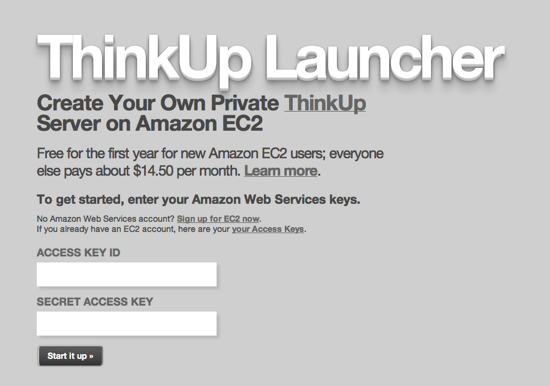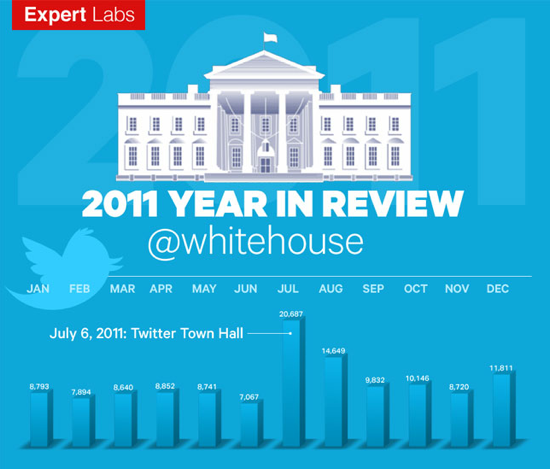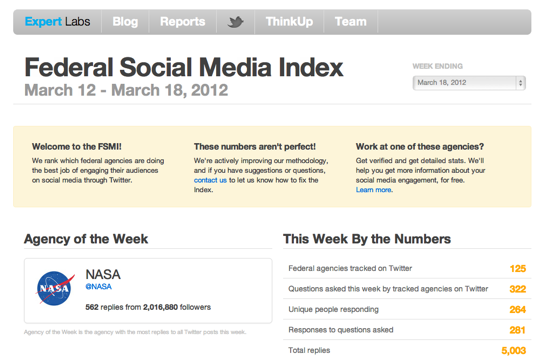Gina and Anil both announced this already, but I was so busy wrapping up loose ends, I didn’t get around to my announcement.
Short version: Expert Labs — the non-profit I’ve worked on for the last 18 months — is over. Gina and Anil are rebooting ThinkUp into a commercial entity, but I’ve decided to move on. I’ll continue to act as a ThinkUp advisor, and have already started work on two brand new, soon-to-be-announced projects.
A Quick Review
I worked on a whole bunch of stuff while at Expert Labs, but it took on two themes: bringing ThinkUp to a new audience, and analysis of the data we collected. Since most of this work wasn’t high-visibility outside of the existing ThinkUp community, here’s a quick roundup.
Outreach. It’s the first time in my career I’ve ever worked with self-hosted software, and I spent quite a bit of energy trying to help people understand why they’d want to use ThinkUp and make it as easy as possible to get it installed. It’s hard enough to get people to sign up with a new web service, but one that requires you to install it on your own web server? Damn hard.
Part of this was marketing: I produced two promo videos, showing off the capabilities of the app at different stages. The first video was overly long, too detailed, and a bit cheezy. With the second, I cut out all the crap and asked Clay to narrate a tight, 74-second elevator pitch for why ThinkUp is an essential utility. If you’ve never seen it, take a minute to watch.
Unfortunately, offering a hosted version ourselves was never an option. As a nonprofit, it would have been irresponsible for us to archive people’s social media activity and then disappear when funding dried up. Instead, we tried to make installation as simple as possible.
My first attempt was just getting it up and running on EC2, and making that process as easy as possible with a step-by-step tutorial. Later, I replaced that with the ThinkUp Launcher, a one-click installer that booted a custom EC2 instance with ThinkUp preinstalled. I released the code on Github, so any open-source project could easily make their own launcher.

Finally, in December, a commercial service appeared that offered drop-dead simple ThinkUp hosting. We worked with PHP Fog, a Portland-based cloud hosting company, to support a one-click ThinkUp jumpstart. Here’s the screencast I made, showing off how to get up-and-running in seconds.
To help expand the reach of the app, I worked with Mule Design to figure out what ThinkUp does well, what it could do better, and incorporate those learnings to redesign the next version of ThinkUp. Elements of the redesign have already made their way into ThinkUp 1.0, and will guide later versions of the app.
Analysis. Whether it was making charts, building mashups, or crunching data, I spent quite a bit of effort trying to make sense out of the incredible amount of data being collected by ThinkUp.
I showed off the ThinkUp API with ThinkBack, an open-source mashup that extracted entities from your historical Twitter history to make a time machine of the people, places, and things in your past.
I analyzed Twitter reactions to 2011 and 2012 State of the Union speeches, as well as the White House’s Twitter Town Hall, releasing datasets for each. I even made my first, and only, linkbait infographic summing up the White House’s Year in Review on Twitter.

One of the biggest projects I created was the Federal Social Media Index, which used ThinkUp to gather activity from 125 federal agencies on Twitter, and try to measure their engagement for the questions they ask using some simple metrics. The response was great, showing how much interest there is for additional tools in that world.

Over the last few weeks, I’ve adapted it to use the ThinkUp API and will be open-sourcing the results soon to use on your own projects.
Overall, working with Expert Labs was fascinating for me. I’d never worked with government before, and was able to work with motivated and passionate teams from the White House down to local city government. It was an eye-opening experience, and I learned a ton about cultivating an open-source community, the challenges facing state and federal government agencies, and distributing hosted software. Best of all, I was able to do it all while working with three friends I deeply respect: Gina Trapani, Anil Dash, and Clay Johnson.
The Future
Expert Labs may be ending, but ThinkUp is just getting started. It’ll continue to be free and open-source, and Gina and Anil are spinning ThinkUp off into a commercial entity, using the open-source base to create a new media property. You can read more about their plans on their Knight News Challenge application on Tumblr, which you should totally like and reblog. (The number of votes factors into the Knight Challenge judging!)
And me? I’ll be doing new stuff, like always. I’m still writing my weekly Wired column, working on Playfic, and thinking about big future projects.
I’ve started working on two unannounced projects simultaneously that I’m crazy excited about. Both have to do with this problem: how do you use technology to connect people together in new ways, and help people make a living doing what they love? It’s a running theme through everything I’ve ever worked on, and I’ll be writing much more about them soon.
For the first time in a very long time, I’m also open to hearing about new opportunities. If you’re working on anything along these lines and want help, get in touch!

I’m excited to hear that you’re moving onto new projects as the ones you’re on now mature. Looking forward to hearing what the next thing is, and good luck!
Thanks for the synopsis. I am unabashedly backing ThinkUp.